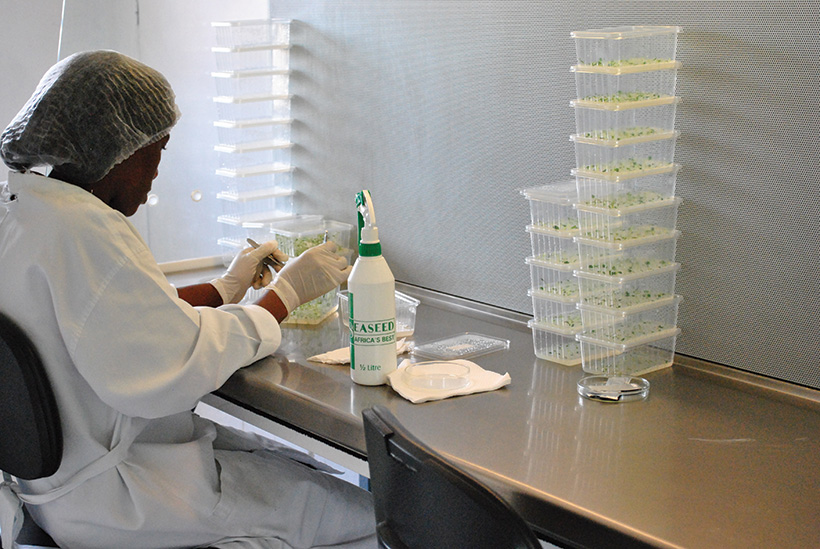Promoting bioeconomy in eastern Africa
A high-level forum on developing a bioeconomy in eastern Africa will be held in Kigali, Rwanda, on 2, 3 and 4 November 2017, through a partnership between the country’s National Commission of Science and Technology (NCST); and the Nairobi headquartered BioInnovate Africa programme, and the International Centre of Insect Physiology and Ecology (icipe).
The meeting will also include the announcement of the winners of a grant fund totalling US$ 6 million, managed by BioInnovate Africa programme, which is intended to enable scientists, researchers, innovators and entrepreneurs in eastern Africa work together to turn innovative ideas and technologies based on biological sciences into viable businesses.
“A bioeconomy brings together the commercial activity surrounding the use of renewable biological resources – such as crops, forests, animals and micro-organisms (like bacteria) – to solve challenges related to food, health, environmental protection, energy and industrial processes,” explains Dr Julius Ecuru, Programme Manager, BioInnovate Africa.

He adds: “The main advantage of a bioeconomy for eastern Africa is its high innovation potential; the fact scientists and entreprenuers use scientific knowledge and technologies on living organisms or biological systems to create new economic enterprises. This knowledge-based approach on harnessing biological resources results in business partnerships between scientists, inventors, small and medium-sized enterprises, farmers, and eco and social entrepreneurs, which are more efficient and less damaging to the environment. A bioeconomy can, therefore, bring about economic growth and the international competitiveness of a country or region, while creating new employment opportunities.”
Like many parts of the continent, eastern Africa possesses large quantities of renewable biological resources. A bioeconomy would be highly impactful in the transformation of the agricultural sector, which is the backbone of most economies in the region. Therefore, adopting a bioeconomy development model presents a viable way for promoting inclusive growth, by creating opportunities for critical sections of society such as women and the youth.
The forthcoming forum will explore opportunities and find ways to address challenges for bioeconomy development in eastern Africa. Specifically, the forum will consider strategies to create stronger links between scientific institutions, policy and private sector actors. The deliberations will also propose a roadmap towards developing a regional bioeconomy strategy.
Notes for Editors
BioInnovate Africa (The Bioresources Innovations Network for Eastern Africa Development) Programme is a regional initiative supported by the Swedish International Development Cooperation Agency (Sida) to assist countries in eastern Africa benefit from the revolutionary advances in biosciences, converting these technologies into innovations for inclusive growth and sustainable development. BioInnovate is based at the International Centre of Insect Physiology and Ecology (icipe) in Nairobi, Kenya, and currently operates in six eastern African countries namely: Burundi, Ethiopia, Kenya, Rwanda, Tanzania and Uganda. BioInnovate Africa evolved from BioEARN – a regional network of research excellence in biosciences founded in 1999. In Phase I (2010 – 2015), the Programme focused on building innovation consortia/platforms on crop improvement technologies, value added products from millet and sorghum, sustainable utilisation of agro industrial waste and bioscience innovation policies. In Phase II (2016 – 2021), BioInnovate Africa will build on these efforts, with more emphasis on linking biobased ideas and technologies to business by developing and piloting economically viable biobased technologies and products; and engaging policymakers to evaluate relevant policy options that support bioscience innovations.
The International Centre of Insect Physiology and Ecology (www.icipe.org), is a world-class research centre whose mission is to contribute towards poverty reduction, food security, better health and environmental protection across the developing world, by enhancing the capacity of researchers and communities to produce and utilise insect sciences. icipe is headquartered in Nairobi, Kenya, with a country office in Ethiopia and several field stations in Kenya. The Centre currently has operations in 30 African countries, and thriving partnerships with universities and research organisations across the world.
National Commission of Science and Technology (NCST), Rwanda: The NCST strives to contribute to Rwanda’s transformation into a country where the potential of science, technology and innovation is fully harnessed and integrated to enhance people’s wellbeing, sustainable national economic growth, entrepreneurship and competitiveness. It was established in 2012 with a cross cutting mandate of providing informed and strategic policy advices to the Government on issues pertaining to the development of science, technology, innovation and research. NCST advises on human capacity building strategies to ensure the availability of a critical mass of skills in science and technology to support the achievement of a competitive and sustainable socio-economic development.
Contacts
For further information, contact: BioInnovate Programme Management Office,
Email: bioinnovate@icipe.org, Tel: 254 (20) 863 2433

